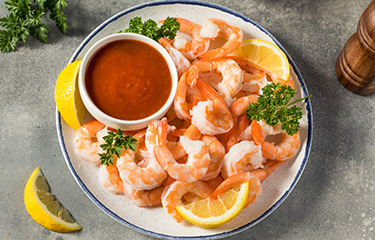Shrimp might be back on the menu for millions of people who suffer allergic reactions from eating the shellfish.
A peer-reviewed article published in the Journal of Agricultural and Food Chemistry, “Reduced Allergenicity of Shrimp (Penaeus vannamei) by Altering the Protein Fold, Digestion Susceptibility, and Allergen Epitopes” has found reverse-pressure sterilization can produce a less-allergenic roasted shrimp product.
A group of seven researchers at Dalian Polytechnic University’s National Engineering Research Center of Seafood fed shrimp that had undergone reverse-pressure sterilization, in which the crustaceans were exposed to a high pressure and steam, to mice with shellfish-consumption sensitivities, and found it did not cause severe allergic reactions.
Pastes fed to the mice from raw and roasted shrimp that had not undergone reverse-pressure sterilization caused increased levels of histamine and spleen and lung damage, but the mice that ate the treated shrimp had milder reactions and less organ damage, according to the American Chemical Society, a nonprofit organization that supports chemistry-related research.
The study’s finding might have a broader impact, as it advances knowledge on the response of the human body’s immune system to foods it can mistake as threats. It could potentially lead to the development of more hypoallergenic versions of foods commonly producing allergic reactions in human, such as dairy products, nuts, wheat, and other types of seafood. Food allergies affect an estimated 15 million persons in the United States and are responsible for approximately 30,000 emergency department visits and 150 to 200 deaths annually, according to the U.S. Centers for Disease Control.
The study found reverse-pressure sterilization degraded the potentially problematic proteins when heated, altering them in a way that could prevent human antibodies from creating an overreaction from the human immune system.
Roasting some foods can have the same benefit, but in certain items, such as oysters, roasting may actually increase their allergenicity. Reverse-pressure sterilization, which caused shrimp proteins to cluster together, inhibiting the ability of antibodies from latching onto them and therefore reacting to them, could be a solution to create more hypoallergenic food products in the future, according to the study.
Photo courtesy of Elena Gordeichik/Shutterstock







